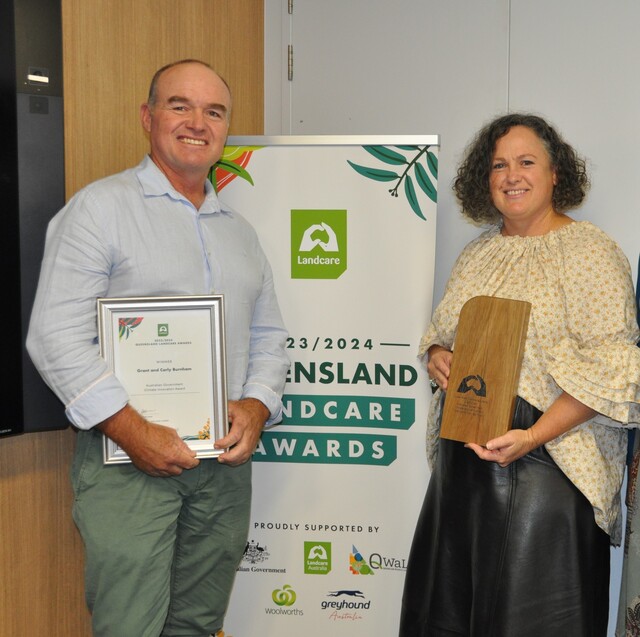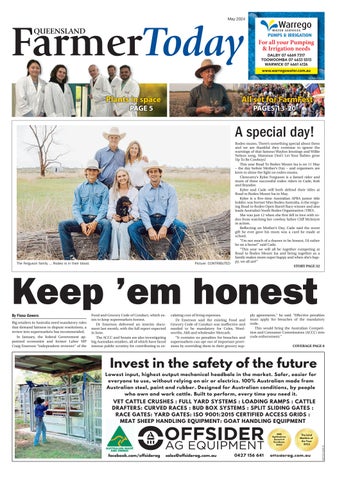Grant and Carly Burnham’s unique love and care for their land has been recognised with the Australian Government Climate Innovation Award.
The North Burnett couple won the Landcare award, at the award ceremony in Yeppoon on Saturday, 25 May, for their holistic and innovative practices. They call themselves soil farmers, as they use innovative and organic practices at their property, Bonnie Doone, located west of Monto.
Grant is a third-generation beef producer, and Carly a fifth-generation beef producer in the North Burnett area.
The couple originally started their business underneath Grant’s parents in 2000, before building up their own business in 2010.
Originally needing to reduce imputes and the need to be more productive with less land, they started to learn new farming practices.
“We did quite a bit of training through resource consulting services in Yeppoon,” Grant said.
They adopted holistic practices and changed their whole way of thinking about cattle production to focus more about the land and health of the ecology. Through that, they ended up requiring less and less imputes, less chemical interventions and their grazing practices became more holistic.
“We use time control grazing or cell grazing to manage our cattle and manage the landscape. As a result, things started healing and parasites became less of an issue…,” Grant said.
The changeover from focusing on beef production and cattle health, to more of an ecological land steward, it requires more management, such as more water and fencing. They have 70 troughs now and have fenced their 20,000 acres into almost 150 smaller paddocks.
The family then mobbed their cattle into smaller groups of around 500-600 heads, and move them around 15-30 paddocks per mob.
“They short graze, in large mobs, in small areas and move reasonably quickly so that landscape, and all the plants in it, have long recovery periods after they’ve grazed it,” Grant explained.
So, what is time-controlled grazing?
“The time control rising that we use is one of the most ancient styles of grazing, the herders and shepherds back in ancient times used to move their animals from area to area, when there were no fences or property boundaries… that’s why the landscapes were so abundant and productive.”
He explained that they are just mimicking that style with their electric fences.
“The aim of what we are doing is to just keep green plants growing for as long as possible throughout the whole year, so the greener plants we have growing… the more sugars are being converted from sunlight energy and being put into the soil. That’s really how soil carbon comes about and when its locked away at that depth its, one of the most secure carbon sinks there is… it’s a really positive thing.”
They have almost been able to double the productivity of their cattle, as well as increase the carbon.
“A lot of this management was undertaken when we started our soil carbon project in 2016,” Grant said.
“Under the government regulation of the soil carbon project, you are required to change your management practices from what you are normally doing.”
They won the Landcare award due to this incredible attitude towards their farming.
There is clear evidence to how the change to time-controlled grazing benefited the soil and the land.
“We core sampled parts of the properties, down to a depth of 1.2 metres and then that goes through to a lab and they measure the accurately lever carbon levels in that soil to that depth, and then we measured it again five years later in 2021 and in that resulted in the issue of Australian carbons units, for the amount of carbon we were able to get out of the atmosphere and put into the soils,” Grant said.
Having won the award was so exciting for the family, they are proud to be able to showcase the great things farmers are doing for landscapes.
“We are immensely proud of being able to represent good land stewards and we fully understand we are one of many…there’s some great people doing wonderful things out there within agriculture, in Landcare, in community groups,” Grant said.
“It was a real honour to be put up beside those wonderful people… we were quite inspired by the other people there,” Grant continued.
They are one of five properties that initially joined the carbon project, four out of those five properties have been issued carbon credits, with theirs being the largest to date at this stage with 94,666 Australian Carbon Credits.
The couple have spoken at a number of events, they host university bus tours, grazing tours come through, and they are involved with local schools who bring their ag students to see their innovative practices.
“We are really keen to spread the word and hopefully gain some knowledge from other people as they travel through,” Grant said.
His advice to other farmers is to; “just love the land, that’s where it really starts and be equally if not more focused on the health of the land, then the productivity and the bottom line.”
“There is always more stuff to learn, and they have more carbon projects in the works for the remainders of the properties and continue to help others,” Grant said.
“Our legacy is always to leave the land in better shape than we left it…Everyone has a role to play in the health of our ecosystems and climate in general.”









